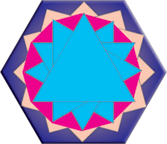 | The Dozenal Society of Great Britain |
It′s Counting, Jim - but not as we know it!We want to replace decimal numeration with dozenal |
|
|
|
|
|
A fact or two: Any and every type of calculation which can be carried out in base ten can be carried out in base twelve or in any other base one might choose. The merits of base twelve are due to the great factorability of the number twelve, the next really useful number being sixty, but sixty is rather too large for an every-day number base. Ten is unsatisfactory because its factors 2 and 5 include the prime 5 which in turn is not as useful as the prime 3 (though one professor of mathematics complained that I was not being really fair to the number 5 when I said this ... ). The dozen, and the dozen dozen, or gross, have shown their usefulness in packing and packaging over many, many years. And will Mankind be interested enough to listen? or kind enough? We live in hope… Aye, it′s counting, Jim, but not as we know it…But just consider, for a moment ... What would happen, if ...?Now there's a thought to boggle the mind... Suppose we changed the number base, just like that, what would tomorrow be like? For the implications, have a look at "Splash!". So it′s nothing but base twelve here?No, there's more, all mathematical, - other bases, number puzzles, units of measure (including historical), important essays, some metric-bashing, - and more to come as we develop different areas. Magazine: We no longer publish a regular Newsletter or magazine - all new work appears either here or in the Dozenal Forum, which has attracted many new members with valuable ideas and comments. Our pages here average some two hundred visits each week. The last Dozenal Journal we sent out to members is available for download: Journal as are other digital editions of previous publications. Issues of the Journal and previous DSGB magazines are being digitized and several are available for download. This, and revision and editing of DSGB website pages, will be occupying us for some time. With effect February 2017 Shaun Ferguson retired from the posts of Secretary and Treasurer of the DSGB, and Bryan Parry has taken over those posts. Bryan can be contacted on home email, and on dsgb email Most recent changes (November 2020): Several hyperlinks updated and some removed: January 2018: More DSGB magazines digitised; some editing and tidying of the "Basics" section, "Dozenite system" by Pasumarty added; New dozenal url references, Dozenal apps from the DSA. "Splash" section revised and extended; New dozenal clock for your desktop (java) - in Applications; "Hamburg Musical Notation" added to application section; TGM (pdf archive of first edition); revised TGM booklet (pdf: spellings, spacing, general corrections), DSGB Newscast Archives added (Magazines in pdf format). These pdf versions of the Duodecimal Newscast have been produced for us by the DSA from scans of the original magazines. More will be published here in due course. In Memoriam - an obituary for Arthur WhillockOur Information Secretary, Arthur Whillock, died on Saturday 27th May 2006. Student Projects.We have had many enquiries from students who are studying base twelve for their mathematical project. (Everyone gets a reply, by the way.) All the information they require is to be found on this website and on that of the DSA, but questions are always welcome. Many of the answers about the advantages of dozenal (and the disadvantages of decimal) are to be found in the writings of members of the DSGB and have been published in our magazines - of which I would draw attention to our Dozenal Journals edited by Donald Hammond, and to be found listed in the literature section of this site. They are in pdf form for download and further study. They also contain some rich mathematical content relevant to the study of numbers and their practical applications. |
a few words about us...The DSGB, The Dozenal Society of Great Britain (founded 1959) and the DSA, The Dozenal Society of America (founded 1944) are separate organisations with a common aim: to draw attention to the advantages of the Dozen (or twelve-based) system for numeration and measurement. We consider that the decimal system is inadequate and of limited competence in many aspects of numeration. Decimals handicap the teaching of arithmetic and so inhibit understanding of the physical world and the decimal system is unable to express in simple terms the common proportions by which we order our practical and economic activities. Membership of the Societies is open to all who have an interest in the development of arithmetic and measuring systems as vital tools for our everyday affairs and in promoting a clearer understanding of the ways in which the physical world is defined and ordered. By advocating the adoption of a more flexible numbering system for both scientific and general use we are also supporting the opinions of many philosophers and mathematicians, both past and present. More at About Us a PDF file introducing the DSGB and see below for details of the DSA. to contact us:
|